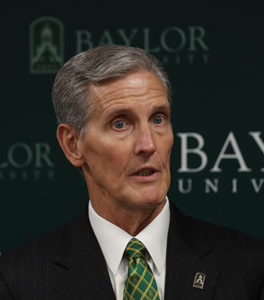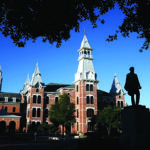WACO—Baylor University’s newly approved academic strategic plan includes a foundational goal to develop a community known for its “unambiguously Christian educational environment.”
Baylor’s board of regents approved a plan to implement Illuminate, the university’s academic roadmap for the next five years, at its May 11 meeting in Waco. The board also approved a doctor of philosophy in preaching degree program at Baylor’s Truett Theological Seminary.
In addition to the goal regarding an “unambiguously Christian” environment, the other three pillars of Baylor’s plan are to create a community recognized for:
- “Transformational undergraduate education.”
- “Research and scholarship marked by quality, impact and visibility.”
- “Nationally recognized programs in human performance through the arts and athletics.”
Christian missions ’embedded’ in plan
An earlier draft of the four pillars included references to “deep faith formation in the Christian and Baptist tradition” and “excellence in teaching and mentoring.”

President Linda Livingstone emphasized Baylor remains “deeply tied to its Baptist tradition” and that the university’s Christian educational environment and Christian mission “flow out” of its Baptist heritage.
She also noted the reference to excellent “teaching and mentoring” is one aspect of a “transformational undergraduate education.”
“Elements of Baylor’s Christian mission are embedded in all aspects of the plan,” Livingstone added.

Joel Allison, who was elected to a second term as chair of the board of regents, reiterated one of the “non-negotiable” considerations for any decision made by the board or administration is that it “keeps Baylor a Christ-centered institution.”
Signature academic initiatives outlined
Regents approved five signature academic initiatives related to the plan, which Livingstone identified as “building on Baylor’s strengths” while addressing critical needs in society:
Sign up for our weekly edition and get all our headlines in your inbox on Thursdays
- Health—Focus on environmental, family and community factors in health, biomedical research, health policy, law, leadership and ethics, and undergraduate health and medical education.
- Data Sciences—Focus on biomedical informatics, cybersecurity and business analytics, with an overarching theme of ethical uses of large-scale data.
- Materials Science—Focus on technologies that make products faster, stronger and lighter, providing solutions for enhanced quality of life.
- Human Flourishing and Ethics—Focus on understanding the conditions by which humans, communities and societies flourish.
- Baylor in Latin America—Focus on health and disease prevention; business development and international trade; human capital formation and education; immigration, migration and human trafficking; congregational development; democratic governance and economics; and culture and arts.
Doctorate in preaching degree approved
The newly approved doctorate in preaching at Truett Seminary—one of five degree programs regents approved—will help prepare “the next generation of pastor-scholars,” as well as equip preaching professors, said Todd Still, seminary dean.
“I am grateful for our university’s approval and support of this strategic doctoral program—the first Ph.D. program for our relatively young seminary,” Still said. “Over time, we trust that this program will produce a steady stream of homileticians who ‘divide the word of truth’ with conviction, clarity, creativity and care.”
Scott Gibson, who joined the Truett faculty from Gordon-Conwell Theological Seminary, will direct the program, expected to launch in fall 2019. It is the only one of its kind in the free-church tradition offered at a major research university, Baylor officials noted.
“The final step of approval by the board of regents of the Ph.D. in preaching signals the beginning of an exciting future for homiletics at Baylor and Truett,” Gibson said. “I look forward to directing the program and to the valuable contributions future students make to the church and to the academy.”
Other professors in the program include Jared Alcantara, formerly from Trinity Evangelical Divinity School, and Joel Gregory, who holds the George W. Truett Endowed Chair in Preaching and Evangelism.
“This is the outcome of more than 10 years of discussions, drafts, rethinking and revising,” Gregory said. “Along with our distinguished new faculty, it marks Truett as one of the national centers of homiletics.”
In other business, regents:
- Approved a $660.1 million operating budget for 2018-19, which includes an additional $9.9 million for scholarships.
- Re-elected Allison as chair and Daniel Chapman of Dallas, Jerry Clements of Austin and Mark Hurd of Redwood Shores, Calif., as vice chairs.
- Elected leaders for various committees, including Dennis Wiles, pastor of First Baptist Church in Arlington, as vice chair for the student life committee.
- Approved the U.S. Army Graduate Program in Anesthesia Nursing that culminates in a Doctor of Nursing Practice degree program, a Master of Arts in Teaching and joint Bachelor of Science/Master of Arts in Classics degree program; and a Doctor of Occupational Therapy degree program.
- Elected Michael McFarland of Crowley and Todd Reppert of Houston as at-large regents.
- Welcomed Katie Joe Baumgardner Luningham of Atlanta, Ga., and Gordon Wilkerson of Lubbock as regents elected by Baylor alumni.
- Confirmed three regents elected by the Baptist General Convention of Texas—Allison, Rene Maciel from First Woodway Baptist Church and Jennifer Walker Elrod of Houston.














We seek to connect God’s story and God’s people around the world. To learn more about God’s story, click here.
Send comments and feedback to Eric Black, our editor. For comments to be published, please specify “letter to the editor.” Maximum length for publication is 300 words.